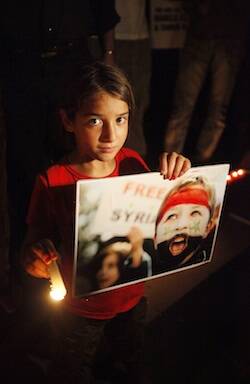In the days of Syria’s president-dictator Hafez al-Assad, so the story goes, a man and his little son were riding a bus through Damascus, whose streets were lined with giant portraits of the ruthless Assad, known to have killed thousands of his political enemies. The little boy gazed in awe at the huge posters and asked his father, “Daddy, isn’t that the big, bad man you told us about, the one you hate?” At that the man quickly grabbed his son, lifted him up in the aisle and called out, “Anybody lose a child?”
The story captures the terror of those years, terror that continues today under Assad’s son Bashar. Syria must decide whether to follow the path of Egypt and Tunisia in the Arab Spring, from dictatorship to the first steps of democracy, or that of Libya into civil war, which ended in the bloody death of its leader. What happens in Syria is crucial because of its strategic location—west of Iraq, south of Turkey, east of Lebanon and north of Jordan—and because of its ethnic diversity, which includes many Christians.
President Bashar al-Assad seems determined to repeat the horror of Hama, the ancient town where in 1982 his father put down an insurgency by slaughtering between 10,000 and 25,000 citizens over 17 days. Though Damascus and Aleppo remain under government control, other towns, particularly Homs—Syria’s third largest city, with a mixed population of Sunnis, Alawites and Christians—are undergoing bloodbaths. In the judgment of the U.N. human rights commissioner, Navi Pillay, a civil war is already underway. The death toll has passed 5,000, including 300 children, and an estimated 14,000 to 40,000 people have been detained. Two hundred thirty-three victims of torture have testified before the U.N. commission. In one bloody December weekend of kidnappings, house raids and random shootings in Homs alone, 36 corpses, many of them headless, were dumped in the town square.
At the center of the crisis is 49-year-old Bashar al-Assad, who had never been interested in politics but was pressed into duty when his older brother died. He presented himself as a reformer and promised a new constitution—in time; but whatever humanitarian instincts he may once have shown have been lost during six years of political indoctrination and the continued integration of the army into the power structure. Some say that his mother’s insistence that he be as tough as his father has contributed to his ruthlessness.
In an interview with Barbara Walters broadcast on ABC’s “Nightline” on Dec. 7, Mr. Assad was soft-spoken but in utter denial about the angry mobs, dead bodies, slit throats and battered faces of children the world has seen on television. “No government in the world kills its people,” he said, “unless it’s led by crazy people.” According to the government’s defenders, the president retains the love of his people and the revolt is the work of the United States, Israel and the Saudis, who wish to undermine the Alawites, Assad’s Muslim sect.
The international community must continue efforts to persuade Mr. Assad to stop the killing of his own citizens, and it should then resolve the now localized conflict before Syria morphs into another Libya. In various ways the European Union, the Arab League, Turkey, the United Nations, the United States, Jordan and Hamas have endeavored to persuade President Assad to relent. Secretary of State Hillary Clinton has met with the rebels, and the United States has returned its ambassador, Robert Ford, to the scene he had earlier fled for his own safety. Jordan’s King Abdullah told the BBC that if he were in President Assad’s position, he would step down. Turkish troops might establish a buffer zone on the border for Syrians fleeing persecution.
International sanctions are showing some effect. Foreign investment has halted, and tourism has stopped. Syrians have patiently survived sanctions in the past; but younger businesspeople see Syria as now connected with and dependent on the world economy, and they think it cannot afford to isolate itself. Perhaps, with President Assad determined to hold on to power, the civil war will grind on until Syria resembles Libya or Iraq. Alternatively, the president could immediately institute his promised reforms: pull the army off the streets, end single party rule, present a constitution for a parliamentary republic, and set the stage for elections and a transfer of power.
In the end, Syrians may tell another tale. A Syrian Rip Van Winkle falls asleep in a cave with satellite television. He awakes generations later, turns on the news and finds Tunisia, Libya and Egypt prospering as democracies. On the Syrian channel the announcer drones: “President Assad IV has vowed to liberate the Golan Heights from Israel.” The man goes back to sleep.









The teacher called in the student and asked, pointing to the student's essay, "Was this a sincere effort? I need to know that before I grade it. If it wasn't, I'm going to grade you on your resistance to the coercion that we, the 'adults', exercise on you to make you come here every day. I'm going to give you an "A" for that. Of course, that "A" won't show up on your 'official' record. You'll have it on your own scorecard to savor the next time you get hijacked. 'Every blow that doesn't break your back makes you stronger.' Learning to stick up for yourself, to not jump through hoops to earn treats, is the real lesson of life, but don't ever expect to get a certificate from The City Fathers-let's call them that-because that's not what they want. They want you to jump through hoops."
The student said, "Let me try again."
The teacher said, "I've warned you what you getting into."
The student said, "So we're in this together."
The teacher said, "Thanks. God, it's hard."
He gave the student the last word. The student said, "Hey, what'd you expect?"